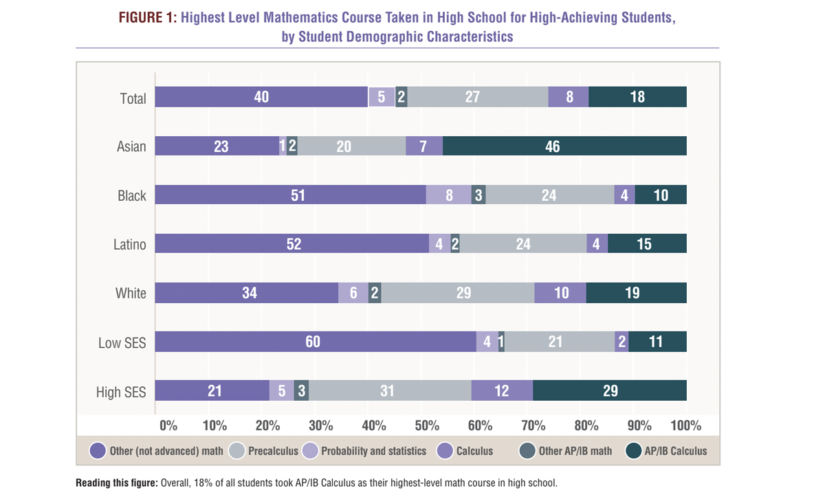During this summer, a team of students from MIT embarked on a journey to the sou …
Access to Advanced High School Math Classes is a Game Changer for Some High Achievers
Carlos Changemaker

According to new research, high-achieving Black, Latino, and low-income students who successfully complete algebra in the 8th grade tend to take fewer advanced high school math courses compared to their white, Asian, and more affluent peers.
However, the research also highlights the positive impact of gaining access to advanced math classes in high school for these underrepresented students. They experience better academic outcomes, including higher graduation rates, GPAs, college admission rates, college persistence rates, and STEM credit attainment at highly selective colleges.
The report, published by Just Equations and The Education Trust, analyzed eight years of data from 23,000 ninth graders in 900 private and public schools across the United States. The study tracked these students from 2009 through high school and college.
Past research, cited in the report, has shown that Black, Latino, and impoverished students are less likely to be assigned AP math courses, enroll in STEM majors, or attend top-tier colleges compared to their wealthier, white, or Asian peers. The report emphasizes that access to advanced math courses should not be determined solely by talent and academic achievement but should be equitable for all students regardless of race, wealth, or privilege.
The study found significant disparities in the number of high-achieving students taking college-level AP/IB calculus by the end of high school. While 46% of high-achieving Asian students, 19% of white students, and 29% of students from high-socioeconomic backgrounds took these courses, only 10% of Black, 15% of Latino, and 11% of lower-income high-achievers did the same.
The study also found that when underrepresented high-achieving students take advanced math courses, the graduation rates for these students level off. Approximately 99% of Asian and white students, 98% of Black students, and 96% of Latino and lower-income students graduated within four years. On the other hand, high-achieving students who did not take advanced math classes experienced a decline in graduation rates, with noticeable gaps along racial and socioeconomic lines.
Melodie Baker, the national policy director at Just Equations, stated that access to advanced math courses should not be solely based on students’ aptitude and proficiency. She emphasizes the importance of addressing the hidden prerequisites related to race, wealth, and privilege that restrict opportunities for underrepresented students, leading to limited access to STEM education and college opportunities.
The decline in U.S. students’ mathematics performance compared to their international peers is a cause for concern. According to Ivy Smith Morgan, EdTrust’s director for P12 research and data analytics, not tapping into students’ talents will have dire economic implications for the future STEM workforce.
The study also highlights the disparity in opportunity starting in middle school. While 64% of Asian students and 57% of students from higher-income backgrounds took Algebra I or higher in eighth grade, only 24% of Black students, 34% of Latino students, and 25% of students from low-socioeconomic backgrounds had the same opportunity. This early inequity contributes to the overall access gap in advanced math courses.
Districts and states are urged to address these inequities by reforming systems to ensure students have access to excellent math education and support. Efforts should include curriculum revamp, emphasis on equity and student interest, professional development to reduce bias, and automatic enrollment in higher-level math courses.
The research shows that high-achieving underserved students who took challenging high school mathematics coursework had better college outcomes. Approximately 74% of Black and 81% of Latino high-achieving students enrolled in advanced math courses followed a standard process of getting into and staying enrolled at college. The percentage dipped to 58% for Black students and 53% for Latino students who did not take these courses. Similar results were observed for students from lower-income backgrounds.
There was also a positive impact on first-year college GPAs for Black and Latino high-achieving students who took advanced math courses. They experienced roughly a half-point gain in their GPA, while lower-income students had a 0.6-point gain.
The report recommends increased funding for challenging coursework, access to support services, and professional development to ensure equitable educational opportunities for all students.
Overall, the study highlights the importance of addressing the equity gaps in math education to create a future workforce capable of filling STEM jobs and driving economic growth.
“Our mathematics education systems are deeply inequitable,” said David Kung, director of strategic partnerships at The Charles A. Dana Center. There is a need to prioritize access, teaching, and advising for Black, brown, and poor students.
Acknowledging the significance of the report, the Dallas school system and the entire state of Texas have implemented policies to automatically enroll students in higher-level math courses.
Chelsea Jeffery, chief regional impact officer at The Commit Partnership, commended the Dallas ISD for its innovative approach and called for other districts to provide similar support to ensure students are prepared for college and the workforce.
The study classifies students as high-achieving if they pass Algebra I or higher in middle school with an A, B, or C grade. Those who score in the highest one-fifth on a ninth-grade math assessment are also considered high-achieving.


